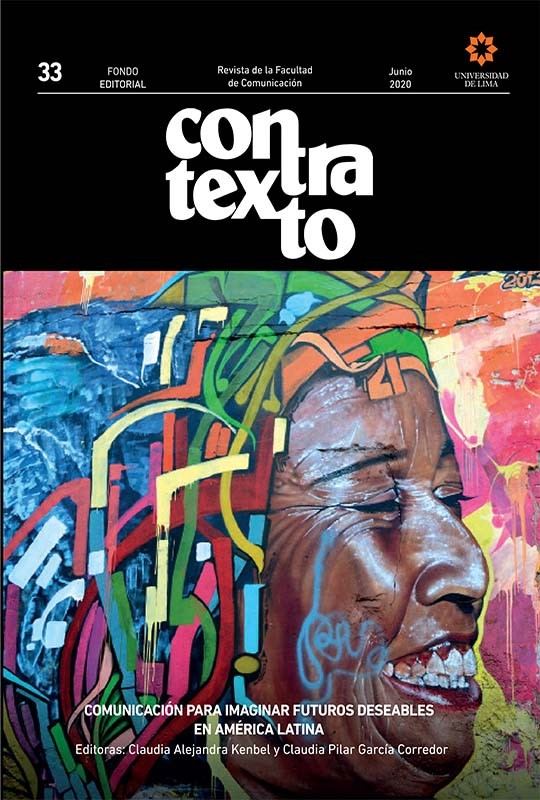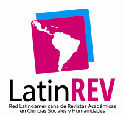Global South Free Culture Meeting: the Community Cultural Production in the Commons’ Construction
Keywords:
Free culture, Community cultural production, Commons, Global South, Free technologiesAbstract
DOI: 10.26439/contratexto2020.n033.4786
In this article, we intend to systematize the networking experience for the Global South Free Culture Meeting, based on the collective construction of the first meeting, entirely virtual, held in 2018. As a method for our reflection, we used the content analysis of the thematic tables, recorded in videos, and participant observation. In our theoretical approach, we bring the debate around the construction of commons and the problematization of the free term in the current political and social context of Latin America, seeking to articulate it with the concept of community cultural production. Then, we present a summary of the process of construction of the Meeting and also of the topics discussed at the event, recording the planning for its continuity. Finally, we believe that the meeting favored the strengthening of the free culture movement in the Global South, which presents itself as an alternative for the construction of common cultural assets based on the differences and peculiarities of these territories
and contributes to mitigate their inequalities.
Downloads
References
<a href="http://baixacultura.org/construindo-o-primeiro-congresso-online-de-gestao-cultural/" target="_blank">http://baixacultura.org/construindo-o-primeiro-congresso-online-de-gestao-cultural/</a>
Baixacultura. (2018). Cultura Livre do Sul Global. Um Manifesto. Recuperado de
<a href="http://baixacultura.org/cultura-livre-do-sul-global-um-manifesto/" target="_blank">http://baixacultura.org/cultura-livre-do-sul-global-um-manifesto/</a>
Benkler, Y. (2006). The wealth of network: how social production transforms markets and freedom. New Haven: Yale University Press.
Cramer, F. (2012). o mal-entendIdo do CreatIve CommonS1. :(){Copyfight:|: Pirataria & Cultura Livre}, 177.
Dardot, P. & Laval, C. (2018). Comum: ensaio sobre a revolução no século XXI. São Paulo: Boitempo.
Demo, P. (2008). Pesquisa Participante: saber pensar e intervir juntos. (2a ed.) Brasília: Liber Livro.
Dionne, J. & Laville, C. (1999). A Construção do saber: manual de metodologia da pesquisa em ciências humanas. Belo Horizonte: Editora UFMG.
Hardin, G. (1968). The tragedy of the commons. Science, 162(3859), 1243-1248. doi:10.1126/science.162.3859.1243
Jesus, P. & Luna, C. E. F. (Março 2017). Produção Cultural Comunitária no Brasil: do empírico ao teórico. Revista Razón y Palabra. 20(495), 55-68.
Kleiner, D. (2010). The Telekommunist Manifesto. Amsterdã: Institute of Network Cultures. Recuperado de <a href="http://www.networkcultures.org/networknotebook" target="_blank">http://www.networkcultures.org/networknotebook</a>
Lessig, L. (2005). Cultura Livre: como a grande mídia usa a tecnologia e a lei para bloquear a
cultura e controlar a criatividade. Trad. F. E. Costa. São Paulo: Trama.
Ostrom, E. (1990). Governing the commons: the evolution of institutions for collective action.
Cambridge: Cambridge University Press.
Pasquinelli, M. (2008). Animal spirits: a bestiary of the commons. Rotterdam: NAi Publishers.
Pasquinelli, M. (2012). A ideologia da cultura livre e a gramática da sabotagem. Em B. Tarin & A. Belisário (Org.), Copyfight: Pirataria e Cultura Livre (pp. 177-185). Rio de Janeiro: Azougue.
Torres, A. L. (2019). A tecnoutopia do software livre: uma história do projeto técnico e político do GNU. São Paulo: Alameda.
Downloads
Published
Issue
Section
License
All of the works published are licensed under a CC BY 4.0 Creative Commons Attribution license. (updated on March 1st 2021)
The content of the journal may be shared in any material or format. The content may be adapted, contributed upon and transformed. Both possibilities are only permitted in so far as they complete the following conditions:
- Attribution: Credit must be given where it is due, a link to the license must be provided and changes, if made, must be indicated. This should be done in the manner deemed appropriate, without suggesting that the licensor promotes you or your use of the material.
Ownership rights
The patrimonial rights for Contratexto are published under a Creative Commons BY 4.0 license, allowing authors to keep the patrimonial rights to their work without restrictions.
If a work published in Contratexto were to be copied, distributed, spread, or any other activities contemplated in the aforementioned license, the author(s) and the journal must be mentioned visibly and expressly.
Self-archive
This journal allows and encourages authors to post items submitted to the journal on personal websites or institutional repositories both prior to and after publication, while providing bibliographic details that credit, if applicable, its publication in this journal.




















